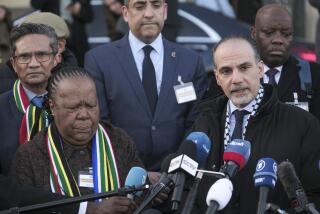Common Market OKs Limited Sanctions Against South Africa : Delays Decision on Proposal to Ban Coal Imports
- Share via
BRUSSELS — The 12 Common Market nations agreed today on a weakened package of limited economic sanctions against South Africa but held back on a key proposal to ban imports of South African coal.
A ban on new investment in South Africa and embargoes on imports of South African gold coins, iron and steel made up the four-part package.
Sir Geoffrey Howe, British foreign secretary and chairman of the foreign ministers conference, said at the end of two days of debate, “We’ve reached a conclusion that sends a clear signal of what we want to see happen in South Africa.”
The ban on iron and steel imports takes effect Sept. 27, Howe said. Further talks at a lower political level are needed to decide how to implement the ban on commercial investment and purchase of gold coins, he said.
Economic, Social Impact
At West German insistence, the ministers dropped consideration of an import ban on South African coal, a move that would have had a much greater economic and social impact on the country.
Danish Foreign Minister Uffe Elleman-Jensen told reporters he will demand that the question of banning coal purchases be reconsidered at the next Common Market foreign ministers meeting set for October.
Elleman-Jensen said that without the inclusion of coal, the sanctions package was “amputated” and of less political significance.
“This has taken something away from the credibility of the (European Economic) Community,” he said. He added, however, that he believes it is “only a matter of time” before agreement is reached to ban coal imports.
$600 Million in Trade
The ban on imports of South African iron, steel and gold coins affects about $600 million in trade. The value of Common Market coal purchases from South Africa totaled $1.3 billion last year.
West German Chancellor Helmut Kohl has argued that economic sanctions would not speed the end of apartheid and would harm poor South African blacks. Prime Minister Margaret Thatcher of Britain has also opposed them.
In Cape Town, South Africa, Foreign Minister Roelof F. (Pik) Botha responded to today’s Common Market action by asking if the members are “prepared to accept responsibility for the suffering and hardship” they will cause.
“We will not initiate sanctions against other countries nor will we impose punitive measures purely for the sake of retaliation,” he said in a formal statement.
Botha said South Africa would study ways of defending its economy.
More to Read
Sign up for Essential California
The most important California stories and recommendations in your inbox every morning.
You may occasionally receive promotional content from the Los Angeles Times.












